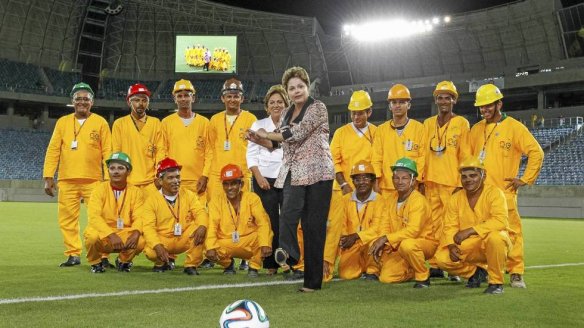
President Rousseff at the opningen of a new World Cup stadium in Natal. FOTO: ROBERTO STUCKERT FILHO/AP/NTB SCANPIX
Brazil’s President Dilma Rousseff must see off two fast gaining rivals to win reelection in October. Problems during the World Cup might end up being be her political downfall.
With the World Cup underway, the eyes of the world are on the football in Brazil. Off the field though, the focus has been on violence in the country’s cities and the wave of protests that started last summer. Protesters took to the streets over the lack essential investment in health, education, transport, and other critical areas of need in Brazilian society, and how this contrasted with the exorbitant sums spent on hosting the World Cup. Cutting across class divides, protests have drawn on a well of popular dissatisfaction over the country’s fading economy and weak public services, the pervasive violence in Brazil’s cities, and a lack of political accountability. Far from being passing concerns thrust into the spotlight by the world cup, these are critical, searing issues in Brazil that are likely to decide the outcome of Presidential elections on the 5th of October this year.
For Dilma Rousseff, Brazil’s current President, the Cup should have been a month long celebration on which she would coast to a second term. This now seems less likely. An able technocrat anointed by her predecessor Luís Inácio Lula da Silva, Rousseff’s approval rating before the protests of last summer was around 60%, with reelection all but guaranteed. Yet following dwindling confidence since the events of 2013, current polls suggest support for Rousseff has plummeted to less than 40%, an almost unthinkably low figure given her previous popularity.
One reason for this backlash is that Rousseff’s embattled party, the Partido dos Trabalhadores (PT), or workers party, has had its credibility wounded from being at the centre of the long-running Mensalão political corruption scandal. While the PT remains popular with the poor due to the government’s Bolsa Familia cash transfer program – which has lifted over 30 million Brazilians out of poverty in the past decade – the party has also become a symbol of the corruption embedded in Brazilian politics. Furthermore, improved living standards have seen many Brazilians become increasingly concerned with issues of public safety and political accountability rather than merely putting food on the table. Worse though is that the good times aren’t rolling like they used to, as stubborn inflation and sluggish growth are slicing away at the wallets of the growing middle class.
Reflecting these new concerns, public security is now the number one election issue for Brazilians, and it is here Rousseff has under-delivered. While her presidency has overseen the continued expansion of Brazil’s power globally, it has cut funding to important domestic security and social programs. In sweeping under the rug election promises to reform police and reduce crime, Rousseff has favoured continuing Lula’s policies of expanding Brazil’s international influence while downplaying problems of violence at home.
While Rousseff remains the frontrunner for now, she faces challenges from two emerging candidates: the the Brazilian Social Democracy Party’s (PSDB) Aécio Neves, a senator and former governor of the business friendly-state Minas Gerais; and the Brazilian Socialist Party’s (PSB) Eduardo Campos, the recent governor of Pernambuco, Brazil’s fastest growing state. Both men come from political dynasties – their respective grandfathers both former state governors – yet are seen somewhat as political outsiders on the national stage. Critically, both have pedigree in tackling issues of violence, economic growth and political accountability.
Both are gaining momentum quickly, though Neves is seen to be the major threat. As governor between 2002 and 2010, Neves presided over a successful streamlining of the state’s public administration under his Choque de Gestão (Management shock) approach, spending more on citizens and less on government. Crime also fell under his watch through the innovative and aptly title program Fica Vivo! (Stay Alive!). Though Neves is criticised by the left that his lean business-like approach will cut public spending and will harm the poor, his ability to whip bureaucracies into shape and improve public security is beginning to resonate with voters.
The dark horse in the race is Eduardo Campos, whose rise from a largely unknown governor of Pernambuco in Brazil’s North-East to Presidential challenger has been remarkable. Elected governor in 2006, he staked his reputation on two critical issues – economic growth and public security. He has succeeded marvellously. Pernambuco is the fastest growing state in Brazil, and the public security program, Pacto Pela Vida (Pact for Life), introduced by Campos has reduced homicides by 60% since 2007. The program is celebrated in Brazil as a template of how to reduce violence through political will, and has been recognised by the UN. Campos’ election chances are also strengthened after he pulled off the coup of convincing Marina Silva, a hugely popular former Minister for the Environment, to run as his number vice-presidential candidate.
That both challengers have economic and public security credentials on their side is problematic for Rousseff. In attempts to shore up her low-income vote she is increasing Bolsa Familia payments, incorporating the tried and true strategy of election year populism. Even so, a sizeable portion of the middle class vote will still be required for victory, and if protests hamper the World Cup this may spell disaster for Rousseff’s chances. Should the World Cup be marred by serious violence, or existing frustrations with the government boil over, it may play into the hands of Neves and Campos.
Brazilian cities deserve to be safer and more prosperous places, and the presidency will likely be decided on who voters think can deliver in these areas. Should Dilma Rousseff be blinded by the glare of the spotlight of this summer’s World Cup, she may end up scoring a political own goal.
This text was first published in Norwegian in the daily Aftenposten, 14 June 2014: Selvmål i Brasil